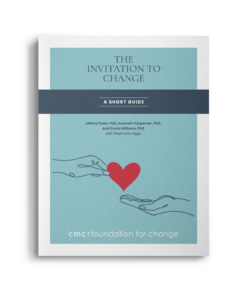For Professionals
Who Can You Help with the ITC?
In 2017, a Pew Research Center survey found that 46% of U.S. adults say they have a family member or close friend who is addicted to drugs or has been in the past, and the COVID-19 pandemic has made the situation even more dire. If you are a treatment provider of any kind, it is likely that you are working with people struggling with substance use and even more likely that you are working with people who are close to someone struggling.
Unfortunately, even though friends and family often face emotional, financial, and health consequences as they try to support the person they care about, they are given the message to detach, use tough love or work on their codependency. The reality is everyone who cares about a person struggling with substance is in a powerful position to support change and there are science-based strategies that can help.
What is the ITC?
Our Invitation to Change Approach® (ITC) challenges these ineffective and stigmatizing messages by bringing evidence-based principles and practices, including kindness, together in a way that lay people (family, friends, first responders, educators, faith-based leaders) and health professionals of all kinds (nurses, doctors, therapists and recovery coaches) can use in their efforts to help a person struggling with substance use or other problematic behaviors. The model includes key elements of CRAFT (Community Reinforcement and Family Training), MI (Motivational Interviewing), ACT (Acceptance and Commitment Therapy) and self-compassion in a framework that is user-friendly, jargon-free, and ready to be used by anyone in a helping role.
In an ITC training you will learn evidence-based ways to understand the motivations behind substance use and other compulsive behaviors, along with motivational strategies that improve communication and promote change. We will give you resources to share with friends and families that emphasize the idea that people can take care of themselves while simultaneously staying engaged and practicing active strategies to help their struggling loved one. The ITC will help you bring science, kindness, and compassion to everyone involved in the change process, including yourself!
What is an ITC Training Like?
ITC trainings are typically 16-hour workshops (virtual and in-person) that take place over 2 full days (typically Friday and Saturday) or several weeks.* We use discussion, videos, role plays and experiential exercises to help you learn and practice the ITC so that you can effectively bring it into your work.
*We can customize the training time blocks to meet the needs of your organization. You can attend an additional 12 training hours spread over the following weeks (typically 2 hours a week) to earn ITC Certification and learn specific strategies for starting ITC groups in your practice or community (more info below).
Professionals who have attended our trainings tell us:
I truly believe I experienced a paradigm shift this past weekend. I have been surrounded by substance use disorder and the devastation it causes my entire life. Because of my background and circumstance, and because I work in the field, when I attend a conference, seminar, or workshop, there generally isn’t too much that I have not seen presented before. However, this weekend left me energized and excited to practice the skills we learned to help a frustrated loved one approach their family member suffering from substance use disorder with the love, respect, and kindness that was never offered to me. I thank you for that. You truly made a difference in the message I will carry forward, and I do not take your trust in me carrying that message lightly. Perhaps little by little we can each chip away at the wall of stigma surrounding substance use disorder, and one-by-one make it easier for people suffering in silence to walk out of the shroud of shame and into the light of hope.
M. Moyer
A Note on Self-Compassion
We accomplish this level of connection to the ITC material and learning process by building community and honoring the often deeply painful and personal parts of working with people who are struggling with behavioral problems such as substance use. Our trainings are designed to help you reflect on personal values that make your work meaningful, and deepen your self-compassion for the heartbreak that can accompany it. The skills in the ITC are designed to help you combat the burn out that many professionals face in their efforts to help.
For more information on the components of the Invitation to Change Approach visit Our Approach page.
Organize a training for your organization or community:
Certification
We offer Level-1 ITC Certification to professionals who complete a 16-hour training along with the 12 additional training hours (for a total of 28 hours).
For more information on this offering, visit our Certification Page.
CEUs
ITC Community Groups
ITC Community Groups are designed for people who care about someone struggling with substance use and want to help. They are a space to share the difficult or painful experiences that often come along with caring, while learning and practicing ITC skills that give members effective skills to use in their helping role. We have created an ITC Groups curriculum that includes tools for understanding, communicating, and creating an environment that is supportive of change—all while making time for practice and self-compassion for group members.
ITC Community Groups are a growing resource with the potential to bring compassionate, evidence-based help to more families than ever. If you’re interested in running one in your community, we could use your help. For more information on how to start a group, visit our Community Groups page.
